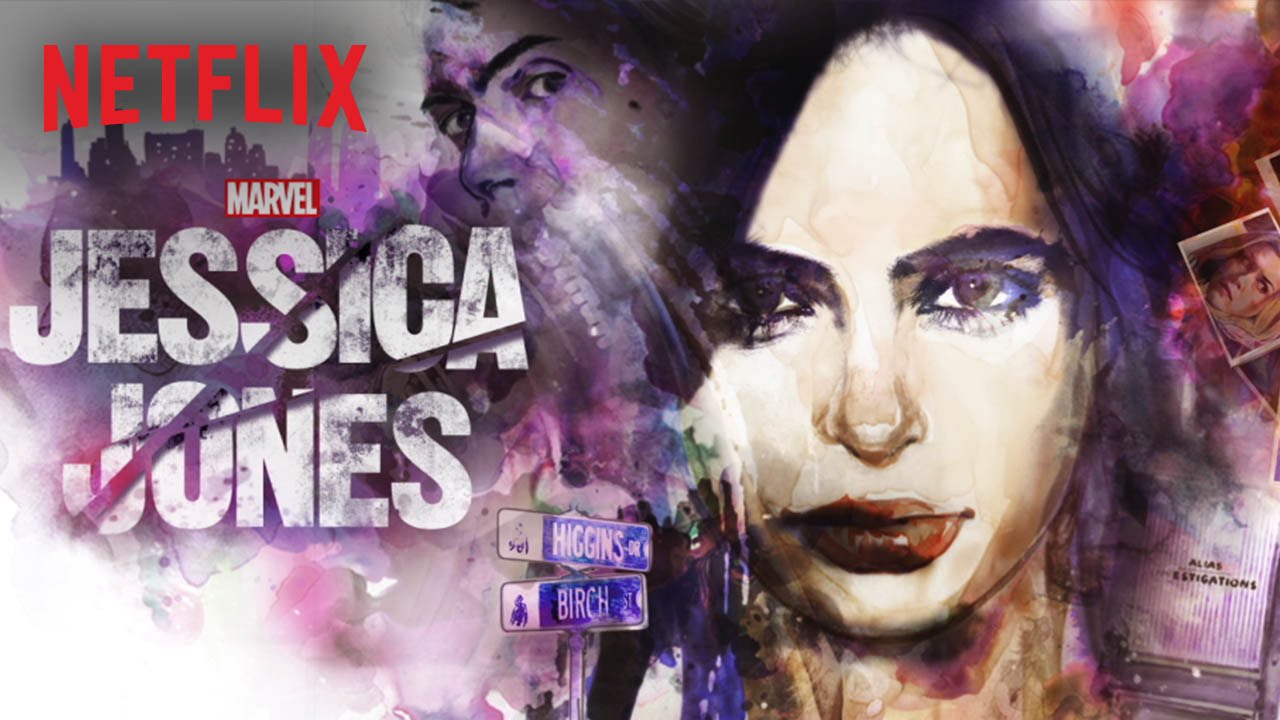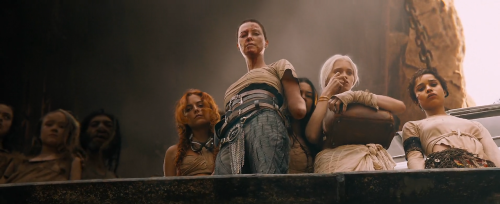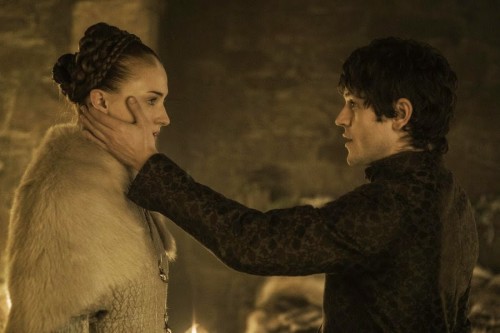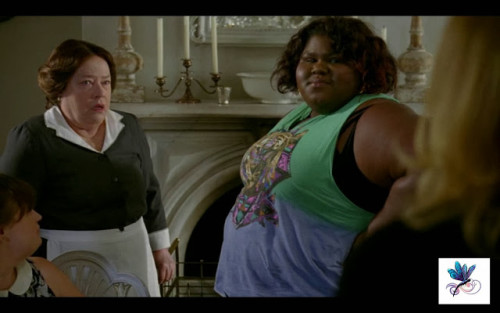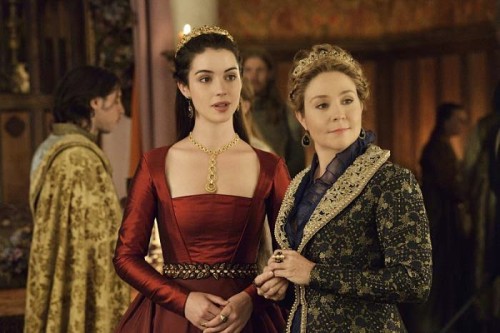This guest post is written by Cate Young and originally appeared at her site BattyMamzelle. It is cross-posted with permission.
Trigger warning for discussion of rape and rape culture.
Marvel’s Jessica Jones is the latest, best example of white feminist fiction: excellent on sexism, terrible on racism. There are a lot of great things about this series that speak directly to the ills that women face on a daily basis. Kilgrave, the central villain, is chillingly terrifying, specifically because the only difference between him and your garden variety abuser is his total power to enact his will. The examination of male entitlement in ways both large and small (by contrasting Kilgrave and Simpson for example) are excellent and poignant. But as I watched the 13 episode first season, I was struck by how callously black people’s lives were treated on the show, rendered into convenient plot devices in service of the white female protagonist’s character development. As a black woman viewing the show, it was easy to see that the active pursuit of liberation from abuse was not a struggle that this show believes includes me (an ongoing struggle for Marvel). Ironically, the best parts of the show are its treatment with its villain, while the worst are its treatments with its female anti-heroine.
While I do have several critiques of the show, there were a number of things that I thought were handled exceptionally well. Firstly, this is a show driven by women about the fears and terrors that women must navigate in the world shrunk down to a micro-level, enabling us an intimate look at the various levels of abuse women routinely endure. The contrast between Kilgrave and Simpson is genius, as it helps demonstrate the full scale of abuse that men knowingly and unknowingly enact on the women around them. The two men are flip-sides of the same coin. While Kilgrave simply takes what he feels he is entitled to by means of his powers of enhanced persuasion, Simpson initially takes a less forceful but no less sinister approach, exemplified in his treatment of Trish after he realizes that Kilgrave has compelled him to murder her. As Stephanie Yang writes in a Bitch Magazine review:
The warning signs are there early on. Under Kilgrave’s control, Simpson assaults Trish inside her own apartment. Once Kilgrave’s control wears off, he’s wracked with guilt and comes back to apologize. The problem is that Trish doesn’t want Simpson’s apology; she wants him to just leave. Trish doesn’t want to be reminded that she was attacked in her own home, or feel trapped by her own high-end security system while her attacker lingers outside. But Simpson is insistent, sitting in her hallway and talking to her through the intercom. Simpson makes his apology about his needs and his absolution, not about Trish’s needs, safety or mental health. It’s entirely understandable, but it’s still wrong.
Simpson and Kilgrave certainly have different motivation for their destructive actions. But as Jessica points out, intent doesn’t matter. Their actions and consequences are what matter. That’s an important distinction that needs to be made at a time when courts and media alike dismiss many real-life cases of abuse because the abuser “couldn’t know” what they were doing was wrong. Violence is a symptom of a culture that indulges bad behavior as being inherently and unavoidably part of masculinity, or even a romantic expression of desire and protectiveness.
I would go a step further and name Simpson’s insistent apologies to Trish as outright abusive on their face, specifically because they prioritize his need for absolution over her need to heal. Trish is the victim in the situation, and yet Simpson manages to find a way to center himself in the story of this trauma. As with Kilgrave and Jessica, Simpson’s abuse is rooted not in a cartoonish hatred of women as we are often led to believe, but rather in prioritizing his own will and desires over Trish’s.
The show’s exploration of rape and consent is also spot-on. Through interaction with Kilgrave’s superhuman abilities, Jessica Jones is able to make plain text of the subtext of rape culture. In one episode, Jessica makes plain that what Kilgrave did to her was rape. She says the word and invokes it over and over, explaining to him that by revoking her ability to consent, he violated her in a profound way that he can never make up for, nullifying any “kind treatment” during that time. For Jessica (and many other victims of sexual abuse) she was raped not only when Kilgrave forced sexual consent by rendering her suggestible, but also by forcing her to display trust and affection for him against her will. We see this idea replicated when Hope demands that she be allowed to abort Kilgrave’s fetus, because “every moment it’s in me is like he’s raping me all over again.”
The other great thing about Jessica Jones is that it is a show ostensibly about rape, that never depicts a rape. It can be argued that the entire engine of the show is powered by the actions of a serial rapist with many, many victims in his wake, and yet the show never feels the need to indulge in crude depictions of trauma to demonstrate how horrifying rape is. Instead, we spend extensive time examining the fallout; following Jessica and Hope as they try to cope with being violated on such a profound level, grapple with their own feelings of guilt and culpability and make it to the other side with their faculties intact. One of the things that made Kilgrave so scary in the initial episodes was the way the memory of him haunted Jessica, always lingering at the edge of her thoughts, out of sight, but never out of mind. It masterfully depicted the way that rape trauma is a burden that doesn’t go away once the act itself is over. In a year that’s been replete with depictions of rape in television, it was refreshing to see a show tackle the true emotional weight of sexual assault without using the violation itself to titillate.
On the other hand, the treatment of people of colour in Jessica Jones is often anti-intersectional and openly anti-black. Vulture‘s year end “Best of Television” list cites the show as demonstrating “a racially diverse cast, heavy on women,” a construction that belies that for many people, diversity means “add black men and stir.” To me, it is borderline disrespectful to call the show racially diverse when the only significant, named woman of colour character is dead before the narrative begins and never speaks a word, while the black male characters are all subjected to incredible violence in service of the white female protagonist. This force frames feminist representation as the representation of white women and yet again, erases women of colour from our popular narratives.
With Reva’s character, this is especially glaring. Her death at Jessica’s hands is essentially the inciting incident of the story; the act that allows Jessica to free herself from Kilgrave’s control. Reva is fridged to motivate Jessica’s escape and eventual confrontation with Kilgrave. As Shaadi Devereaux writes in Model View Culture:
[…] One has to wonder what metaphor is offered, that she has to kill a Black woman in order to finally obtain that freedom. She must literally stop Reva Connors’ heart with a single blow in order to experience her moment of awakening, enabling her to walk away from a cis-heterosexual white male abuser. It brings to mind how white women liberate themselves from unpaid domestic labor by exploiting Black/Latina/Indigenous women, often heal their own sexual trauma by performing activism that harms WoC, and how the white women’s dollar still compares to that of WoC. Like Jessica’s liberation is only possible through the violence against Reva, we see sharp parallels with how liberatory white womanhood often interplays with the lives of WoC. Were the writers consciously aware of these parallels, or was it just the same script playing out in their heads?
It’s disappointing that the show, knowingly or not, replicates the same cycles of abuse that routinely play out within the feminist movement, by positioning violence against black women as the justified cost of white women’s liberation. Jessica eventually enacts the same cycle of abuse against Luke Cage, her main love interest. Shaadi notes:
After killing Reva, Jessica goes on to stalk Reva’s husband, Luke Cage, in a compulsive and boundary-violating cycle of guilt. She finally sleeps with him…without disclosing how she was implicated in Reva’s death. She both withholds and actively obstructs him from finding out information about his own life, so that she can continue to get what she needs intimately from him. In dealing with her own demons, Jessica violates an invulnerable Black man and lays him a blow that no other character in their universe has the power to. Was this another nod to a complex understanding of gender, race and power, or another trope surfacing in insidious ways?
The issue here is that the show does not give any indication as to whether this is commentary or trope, so we are forced to assume the latter, interpreting the text as presented to us. Jessica makes a habit of using the black men around her, in service to her own ends treating them as interchangeable and disposable, a glaring and problematic oversight given the current political climate, and the historical context of black men being subjected to undue violence for the protection of white women. Jessica’s pursuit of Luke despite her knowledge of her involvement in what we are led to believe in the most painful event of his life replicates the same disregard for his feelings that we saw Simpson demonstrate with Trish. To Jessica, her own need to be in Luke’s orbit because of her overwhelming guilt and self-loathing, supersede his right to be fully informed about the circumstances of his wife’s death, and as Tom and Lorenzo astutely write in their review:
[…] Like it or not, she has the capacity to be a bit hypocritical about Kilgrave’s abilities choosing to think that there’s actually a right way to take people’s control away from them.
And Jessica very literally takes Luke’s control away by not disclosing her involvement in Reva’s death. She takes away his ability to choose not to be with the person who murdered his wife. Later, his choice to forgive is later revoked by Kilgrave, as he is forced to reconcile with her under Kilgrave’s control. Again, the invulnerable black man’s pain is not respected, but rather toyed with and manipulated by the narrative to serve the needs of white characters. As Shaadi again points out, the pattern becomes more uncomfortable and glaring as the series continues:
When her neighbor shares how Black people are more vulnerable to others’ perceptions, it invokes not sympathy but an idea of how she can use it for her own ends. The result is several scenes where she pushes Black men into people to create a scene of chaos, using the opportunity to go unseen as she breaks the law. Instead of challenging oppressive systems directly, she uses them to get what she wants and to center her own survival. We see that she has some guilt about it, but sis willing to do it for her survival and the survival of other white characters.
These scenes demonstrate that as people marginalized along a spectrum, we often leverage violence against others for our own survival, sometimes with full awareness. But is awareness enough? Or as long as power remains unchallenged, will we always be lured by self-priority, the hierarchy of own safety and access? Our hero is willing to take on the mindcontrol of Kilgrave, but not those dangers most affecting the two most important men in her life – both Black. She intimately understands that no one will believe her, but capitalizes on the hierarchy of who has enough humanity to be believed – against other marginalized identities. She can finally walk away from the mind of her abuser, but the gravitational pull of racism is still too much.
As a black woman, I’m left to wonder, is Jessica worse than your garden variety racist for acknowledging systems of oppression only to exploit them? And on a real world level, why is this behaviour heralded by viewers as feminist when it actively takes advantage of people that the feminist movement is meant to protect?
My last issue is less a problem with this show specifically and more a general trope in fiction. I expect that very little can be done about this considering the source material, but truly abhor narratives in which a black person’s “power” is that they cannot feel pain or be hurt. It is a direct callback to very pervasive superhumanization bias and stereotypes that still exist and are perpetuated today. As I have written before about this characterization, it feeds into the idea that violence against black people is not traumatic or dangerous as they can withstand the pain, and that this ability positions them as protectors of white characters who often also do them harm. It explains why young black boys are coded by white people as much older than they are, or why they think black people feel less pain. With Luke, we see this reflected in Luke’s fight scenes as person after person escalates the violence against him to no effect. He is easily able to trounce several men at once. Earlier, we also see him take a circle saw to his abdomen in order to demonstrate his power to Jessica. Later still, we see doctors poke and prod him with needles and other penetrating devices ostensibly to save him, but the scenes only reinforce what we have already been told; nothing can hurt him, and so violence against him is justified.
In the end, I would be lying if I said I didn’t enjoy the show. The way Jessica Jones deals with consent resonated with me on a deep level, but it also made me question why the show didn’t identify with me as a black woman, when I so easily identified with it. Hopefully in the next season we will see a more intersectional approach to the struggles that women face that treats its black characters with the same care that it affords the white women in the cast.
Cate Young is a Trinidadian freelance writer and photographer, and author of BattyMamzelle, a feminist pop culture blog focused on film, television, music, and critical commentary on media representation. Cate has a BA in Photojournalism from Boston University and is currently pursuing her MA in Mass Communications so that she can more effectively examine the symbolic annihilation of women of colour in the media and deliver the critical feminist smack down. Follow her on twitter at @BattyMamzelle.
